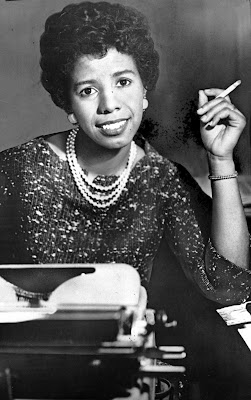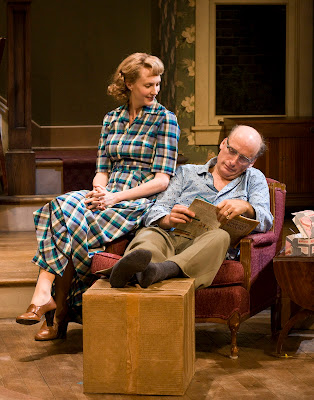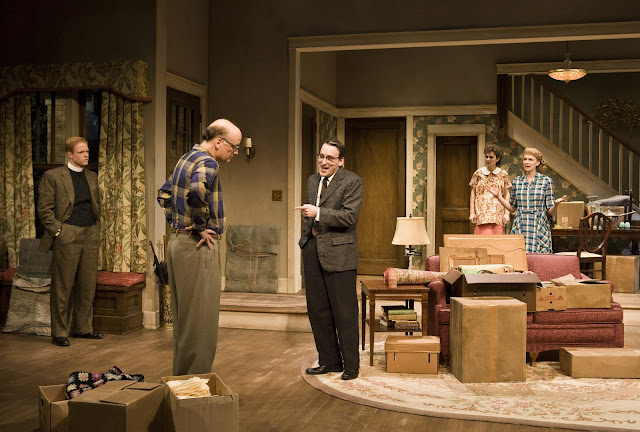By Victoria Looseleaf
Plus ça change, plus c’est la même chose. The more things change, the more they stay the same. Ah, the French certainly have a way with words. And so does playwright Bruce Norris. So much so, in fact, that he snagged the Pulitzer Prize for Drama last year for his prickly play, Clybourne Park, now titillating audiences at the Mark Taper Forum through February 26. (It also won the 2010 Olivier Award for Best New Play in London.)
 A dissection of race, gentrification and real estate – with a dose of turf wars thrown in for bad measure – Clybourne is a dramatic imagining of events taking place before and after Lorraine Hansberry’s seminal work, A Raisin in the Sun. (This is a work so iconic that even Sean “P. Diddy” Combs took to the Great White Way in a 2004 revival, assuming the role of Walter Lee Younger, which was originated by Sidney Poitier in 1959. In addition, Center Theatre Group, in conjunction with Ebony Repertory Theatre, has its own Raisin, through February 19 at the Kirk Douglas Theatre, directed by Phylicia Rashad.*)
A dissection of race, gentrification and real estate – with a dose of turf wars thrown in for bad measure – Clybourne is a dramatic imagining of events taking place before and after Lorraine Hansberry’s seminal work, A Raisin in the Sun. (This is a work so iconic that even Sean “P. Diddy” Combs took to the Great White Way in a 2004 revival, assuming the role of Walter Lee Younger, which was originated by Sidney Poitier in 1959. In addition, Center Theatre Group, in conjunction with Ebony Repertory Theatre, has its own Raisin, through February 19 at the Kirk Douglas Theatre, directed by Phylicia Rashad.*)
But we digress: With the first act set in 1959, when Hansberry’s house on Chicago’s Clybourne Street, is sold to the African-American Youngers, a Mad Men sensibility is perfectly captured, Neapolitan ice cream, high-waisted trousers, faux civility and all. (Hooray, the AMC series returns March 25, we can’t wait!) But soon enough, bigotry bubbles to the surface, unpleasantries are swatted back and forth like tennis balls and swords are drawn. Flash forward half a century and the second act of 2009: The neighborhood, now black and having been ghettoized by drugs and crime (is that redundant?), has again become fashionable, with the house being sold to a white couple. Nouveau riche, it seems, will soon be nouveau biche, as the folks mercilessly go at each other, unleashing a fusillade of feelings through lacerating dialogue and outrageous bon mots.
 Yes, it’s words that are the weapons here, and the original 2010 Playwrights Horizons cast of seven has a blast hurling them, thanks, also to Pam MacKinnon’s laser-sharp direction. Tackling corresponding characters in the second act, this ensemble couldn’t be more well-oiled. Particularly thrilling in his simmering, who-knows-when-he’ll-erupt-volcanic demeanor is Frank Wood, Act I’s troubled hubby (he and wife Bev, at right, expertly played with anal-obsessive repression, i.e., up-tight neo-shrillness, by Christina Kirk, have lost a son to suicide as a result of said son’s actions in the Korean War, compounding the powder-keg-like scenario with a plot point that later resurfaces).
Yes, it’s words that are the weapons here, and the original 2010 Playwrights Horizons cast of seven has a blast hurling them, thanks, also to Pam MacKinnon’s laser-sharp direction. Tackling corresponding characters in the second act, this ensemble couldn’t be more well-oiled. Particularly thrilling in his simmering, who-knows-when-he’ll-erupt-volcanic demeanor is Frank Wood, Act I’s troubled hubby (he and wife Bev, at right, expertly played with anal-obsessive repression, i.e., up-tight neo-shrillness, by Christina Kirk, have lost a son to suicide as a result of said son’s actions in the Korean War, compounding the powder-keg-like scenario with a plot point that later resurfaces).
 Meanwhile, Karl Lindner (Jeremy Shamos) – yeah – the same obnoxious dude who briefly appears in the Hansberry play, has a deaf pregnant wife (a priceless Annie Parisse – who knew that disability could be so, gulp, funny), with the pair lending boisterous bravado to the first act. And let us mention, too, the fine thespian talents of: Crystal A. Dickinson (the perfect embodiment of Bev’s maid, Francine, who unabashedly refuses to accept Bev’s silver chafing dish – like she could ever use such a thing…), Brendan Griffin and, lastly, Damon Gupton, an understated, yet shining presence we also had the pleasure of seeing in Superior Donuts at the Geffen Playhouse. (Click here for our take on that; and here for our remembrances of the late Gil Cates).
Meanwhile, Karl Lindner (Jeremy Shamos) – yeah – the same obnoxious dude who briefly appears in the Hansberry play, has a deaf pregnant wife (a priceless Annie Parisse – who knew that disability could be so, gulp, funny), with the pair lending boisterous bravado to the first act. And let us mention, too, the fine thespian talents of: Crystal A. Dickinson (the perfect embodiment of Bev’s maid, Francine, who unabashedly refuses to accept Bev’s silver chafing dish – like she could ever use such a thing…), Brendan Griffin and, lastly, Damon Gupton, an understated, yet shining presence we also had the pleasure of seeing in Superior Donuts at the Geffen Playhouse. (Click here for our take on that; and here for our remembrances of the late Gil Cates).
And though Norris’ story, mostly a means for a series of ill-conceived arguments and plenty of jokes (the one about a feminine product draws gasps, hoots and the loudest applause), takes no prisoners, it also comes with a pitch perfect dénouement that manages to pack a pathos punch. (Ooh, sorry, but we dig alliteration.)
In any case, listen to the playwright here – in his own words – in our chat with him for KUSC. Norris (right), who gives hope to aspiring scribes and made only $21K in 2009 (mostly from acting), not only confesses that he actually curated most of the jokes, but also tells us why he likes making audiences feel really, really uncomfortable. Then get thee to the Taper to see the play that elevates the spoken jab to Olympian heights. In other words, you’ll be cringing through your guffaws while giving pause to your thoughts. You might also consider grabbing a stiff drink afterwards (no mint juleps, puhleeze), to continue carrying on the conversation that never seems to abate. Hint: It starts with an ‘r.’
This just in: The play, skedded for a Broadway run, has had its plug pulled by impresario Scott Rudin (ooh, don’t mess with the Rudin). But wait: Three days after we wrote about that dust-up, another Broadway producer has come to Clybourne‘s rescue. Norris’ work will now be opening at the Walter Kerr Theatre, courtesy of Jujamcyn Theaters. Great news for all involved, including the original Playwrights Horizons cast, as the ensemble takes to the stage in time for the April 26 deadline for Tony Awards consideration. Talk about drama – way to go, Bruce!
Playwright Bruce Norris told us he thought Doris Day singing Again was a great metaphor for Clybourne Park. We agree! (Taper production photos: Craig Schwartz)
*Rashad is Debbie Allen‘s sister; Ms. Allen was the subject of a recent cover story we penned for Dance Teacher Magazine. Check it out, folks!


